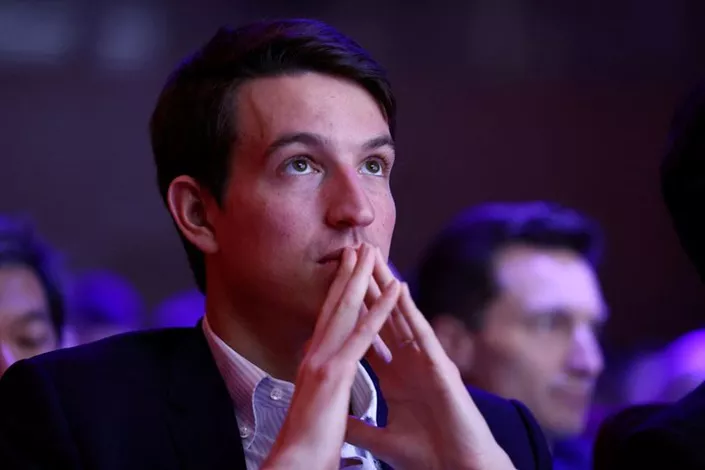Alexandre Arnault, the 33-year-old son of LVMH chairman Bernard Arnault, has been given one of the group’s most difficult challenges: reviving Moet Hennessy, the luxury conglomerate’s struggling drinks division, amid rising tariffs and slowing global demand.
Success could position him as a frontrunner in the unofficial succession race among Bernard Arnault’s five children, all of whom hold leadership roles within the $280 billion company.
Last Tuesday, Alexandre joined his father in Washington for the swearing-in of U.S. Middle East envoy Steve Witkoff. The event, broadcast by local Fox 5, included a White House appearance where President Donald Trump referred to Alexandre as “the future” during a greeting. LVMH has not commented on the meeting.
Though Bernard Arnault remains fully in charge at age 76, his children are increasingly visible in the business. Delphine, 50, is CEO of Dior; Antoine, 47, leads group communications; Frederic, 30, heads Loro Piana; and Jeanne, 26, manages marketing for Louis Vuitton’s watches.
Alexandre, the third child, previously served as an executive at Tiffany & Co. He joined Moet Hennessy in February as deputy to new CEO Jean-Jacques Guiony, a long-time advisor and former finance chief at LVMH.
Moet Hennessy, which distributes products through third-party sellers, once served as a key profit driver for LVMH. In 2024, it generated nearly $6 billion in sales. However, revenues have now declined for two consecutive years. Operating profit fell by one-third last year as U.S. and Chinese demand weakened.
Tariffs have added to the strain. Since champagne and cognac must be produced in specific French regions, they are subject to a 10% U.S. import tariff, which is expected to double in July. Former President Trump has warned of even harsher tariffs—up to 200%—if the EU imposes taxes on American bourbon.
Turning the business around will require both business skill and diplomacy.
“The real test of leadership is how you respond in tough times,” said Markus Hansen, a portfolio manager at Swiss bank Vontobel. “Replicating Bernard Arnault’s success won’t be easy.”
In their first major move, Guiony and Alexandre announced on April 30 that they would cut Moet Hennessy staff by 13% and focus marketing efforts on the group’s biggest global brands. In a video message to employees, Alexandre described the situation as “very difficult.”
Frederic Merceron, a labor representative from the Force Ouvriere union, said the message seemed sincere but employees are still waiting for concrete plans to boost sales.
Alexandre has also taken direct control of Moet Hennessy Private, a division that serves ultra-wealthy clients with exclusive spirits and experiences. The unit, with around 80 employees, famously sold a cask of Ardbeg Scotch for £16 million in 2022 to a private Asian buyer.
“We’re turning this into a standalone unit that reports directly to me,” Alexandre said in the video.
This high-end focus could help offset some of the damage from tariffs and falling demand. However, middle-class customers may shy away if prices rise too steeply. “People might think twice before spending over $60 for a bottle of Moet,” noted HSBC analyst Anne-Laure Bismuth.
Despite recent struggles, Moet Hennessy has long been central to LVMH’s growth. Its profits once funded the acquisition of brands like Bulgari and Hublot, and the opening of flagship stores. In the 1990s, it accounted for over 40% of LVMH’s operating profit.
“It’s been a structural pillar for the family,” said CGT union representative Mathieu Devers, based in the Cognac region.
Today, the division contributes far less—just 6% of operating profit in 2024, down from 20% in 2015. Some analysts believe it could be worth up to €14 billion ($15.8 billion) if spun off and restructured.
Still, Bernard Arnault has ruled out any sale. “Divestment is not on the agenda,” he said in January.
HSBC suggests that LVMH could benefit from a tighter focus on core luxury sectors like fashion, leather goods, watches, and jewelry. But for now, the company’s eyes are on Alexandre and Guiony.
“They have two years to prove themselves,” Bernard Arnault said.
Related topics:


